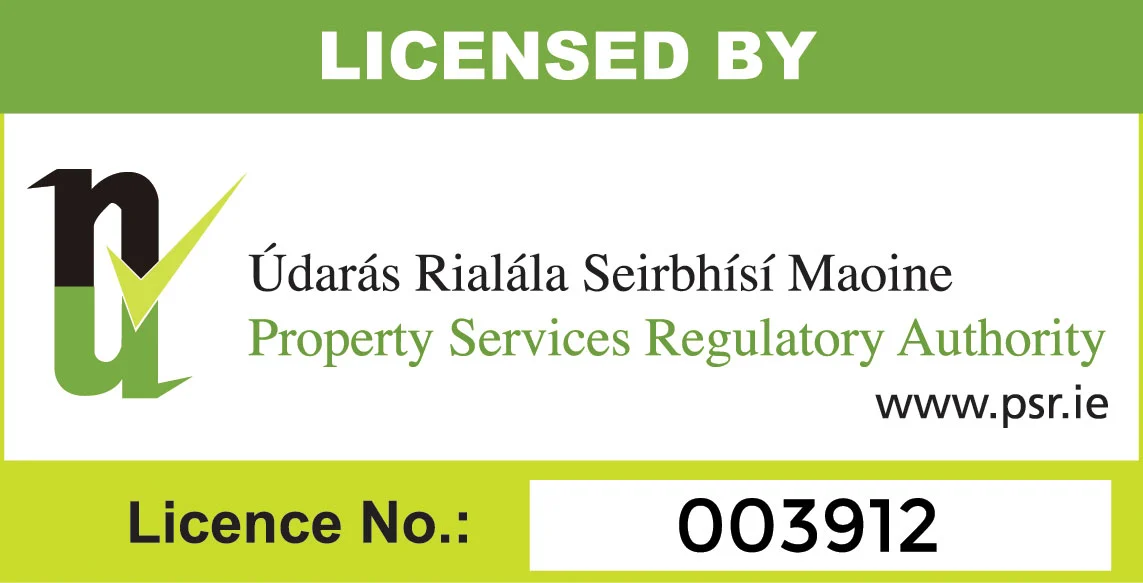Property Conveyancing Solicitors
Contents
What is Property Conveyancing?
Property conveyancing is the legal part of the process of selling a property. It is the process by which title (ownership) passes from the vendor (the seller) to the purchaser.
How Long Does Conveyancing Take in Ireland?
It varies from as quick as three weeks to over a year with around two to three months being standard. Interestingly, in auctions the conveyance happens before the bidding whereas in private treaty, the bidding happens first and then the solicitors get involved at the sale agreed stage. In auctions, as bids are legally binding, bidders’ legal representatives must study title before advising their client as to whether they can place a bid or not.

Booking Deposit
The booking deposit is paid by the purchaser to the estate agent in order to move to sale agreed. This can be requested to be refunded at any point up until contracts are signed. This money sits in the auctioneer’s client account and can only be released to the company account once the sale has closed. Typically the booking deposit is used to discharge the auctioneer’s fee on closing the sale.
What are Title Deeds?
Title refers to ownership i.e. who owns a property and deed is a document. The documents pertaining to the property that are required to pass title from one person to the next are collectively referred to as the title deeds. These include documents such as the grant of planning permission for the property, the contract that passed title to the current owner, LPT payment certificate, NPPR certificate of discharge or of exemption, BER certificate and advisory report, certificate of compliance with building regulations for an extension, the contract for sale that passed title to the current owner, a map showing the boundaries of the property (deed map) and potentially a host of other documents also. If the property owner has a mortgage on the property, the title deeds will be in the possession of the lending institution. If the owner has no mortgage, they are typically stored with a solicitor or in the owner’s safe.
How Long Does it Take to Get Title Deeds from My Bank?
This varies by bank but it can take a number of weeks. This is why it is advised to request the deeds as soon as the property is placed on the market. This gives the vendor’s solicitor time to review them (read title) and prepare contracts for sale. The vendor’s solicitor, when requesting the deeds, gives an undertaking to the bank that no funds will be discharged to the vendor until the bank has been paid back first.
Drafting the Contracts
Once the vendor’s solicitor has studied the title deeds, they will draft contracts for sale and send to the purchaser’s solicitor along with answers to requisitions on title. Requisitions on title is an exhaustive list of questions pertaining to a property that the vendor’s solicitor is obliged to answer and send to the purchaser’s solicitor.
Pre Contract Queries
The purchaser’s solicitor studies the documents received from the vendor’s solicitor and will then typically raise pre-contract queries. These are queries that the purchaser’s solicitor has on foot of studying the contract and associated documentation.
Signing the Contracts
Once the purchaser’s solicitor is satisfied that all pre-contract queries have been answered satisfactorily, they will advise their client to sign the contracts. There are two copies of the contract and both need to be signed.
Contract Deposit
On signing the contracts, the purchaser pays a 10% contract deposit to his/her solicitor. The booking deposit paid to the estate agent is netted against this amount.
Stamp Duty
When paying the contract deposit, the purchaser also pays to his/her solicitor the stamp duty as well as any other expenses such as the solicitor’s fee. Stamp duty is 1% up to €1million and 2% on the balance in excess of this amount. If buying a new property, stamp duty is paid on the ex. VAT amount i.e. no stamp duty is paid on VAT
Exchanging Contracts
The purchaser’s solicitor now sends both signed contracts to the vendor’s solicitor for counter-signing by the vendor. The vendor’s solicitor retains one copy for his/her records and returns one signed copy to the purchaser’s solicitor. Interestingly, this process can be done electronically via digital signatures and the Law Society has approved this. However, the vast majority of solicitors still rely on “wet ink” signatures on hard copies of the contracts.
Agreeing a Closing Date
At this point, a closing date will be agreed between both sides.
Drawing Down Funds from the Bank
Now that the sale is proceeding, the purchaser’s solicitor applies to the bank to draw down funds. (S)he only does this once sure the sale is proceeding as interest and capital payments will be due from as soon as funds are drawn down regardless of whether the sale closes. The purchaser’s solicitor gives an undertaking to the bank that the title is bankable before the bank will release funds. Sometimes a solicitor will qualify title. This is when the solicitor makes the bank aware of an issue and asks the bank’s legal department if they are still in agreement to provide the mortgage. Virtually all contracts have a subject to finance clause which means, if for any reason, the purchaser’s finance doesn’t get sanctioned, the purchaser can withdraw from the contract without penalty and receive the booking deposit back.
Preparing for Closing the Sale
The purchaser’s solicitor will send a schedule of closing documents to the vendor’s solicitor. These are the list of documents that the purchaser’s solicitor requires to close the sale. The purchaser will transfer funds to the vendor’s solicitor in trust i.e. to hold until the sale has closed.
Final Searches and Closing the Sale
On the day of closing, the purchaser’s solicitor will perform closing searches. These are final searches to ensure there are no issues with title before they agree to close the sale. For example, if the vendor has been adjudged bankrupt, then they no longer have the authority to pass title. It is very rare that closing searches return anything that prevents the sale from closing as planned. The purchaser’s solicitor typically uses a bonded search company to perform searches. The results are sent to the vendor’s solicitor to review and reply to the purchaser’s solicitor. On receipt of these replies, the purchaser’s solicitor informs the vendor’s solicitor that the sale is closed and they may release funds to their client. The vendor’s solicitor updates the estate agent to release the keys to the new owner.

After the Close
The vendor’s solicitor requests a redemption statement form the vendor’s lending institution outlining the closing balance for the outstanding mortgage. This must be cleared before any funds can be released to the vendor. The vendor’s solicitor must discharge the charge that was on the property with the PRAI in favour of the vendor’s bank.
The purchaser’s solicitor must file the stamp duty return and pay the outstanding amount. This return is what is used when updating the property price register. If the purchaser has raised a mortgage, the purchaser’s solicitor must file this charge with the PRAI on behalf of their client’s lendor.
Back to Back Close
This is when two sales close on the same day. These are common when a vendor is selling a property to buy another one. It requires careful coordination between solicitors to ensure no last minute snags as if they occur, and one sale closes but the other doesn’t, it can leave the vendor with nowhere to live. In such instances, the vendor may have to seek accommodation in a hotel and will seek compensation from whomever was at fault for the purchase not closing as planned.
What Happens if One Side Misses the Closing Date
If, for example, the purchaser’s solicitor is not in funds (perhaps owing to a delay from their client’s bank), on closing day, the vendor’s solicitor can then issue an ultimatum that if the sale isn’t closed, typically within a couple of days, the vendor will start charging daily interest until the sale closes.

 Marketplace
Marketplace
